ANNUAL REPORT
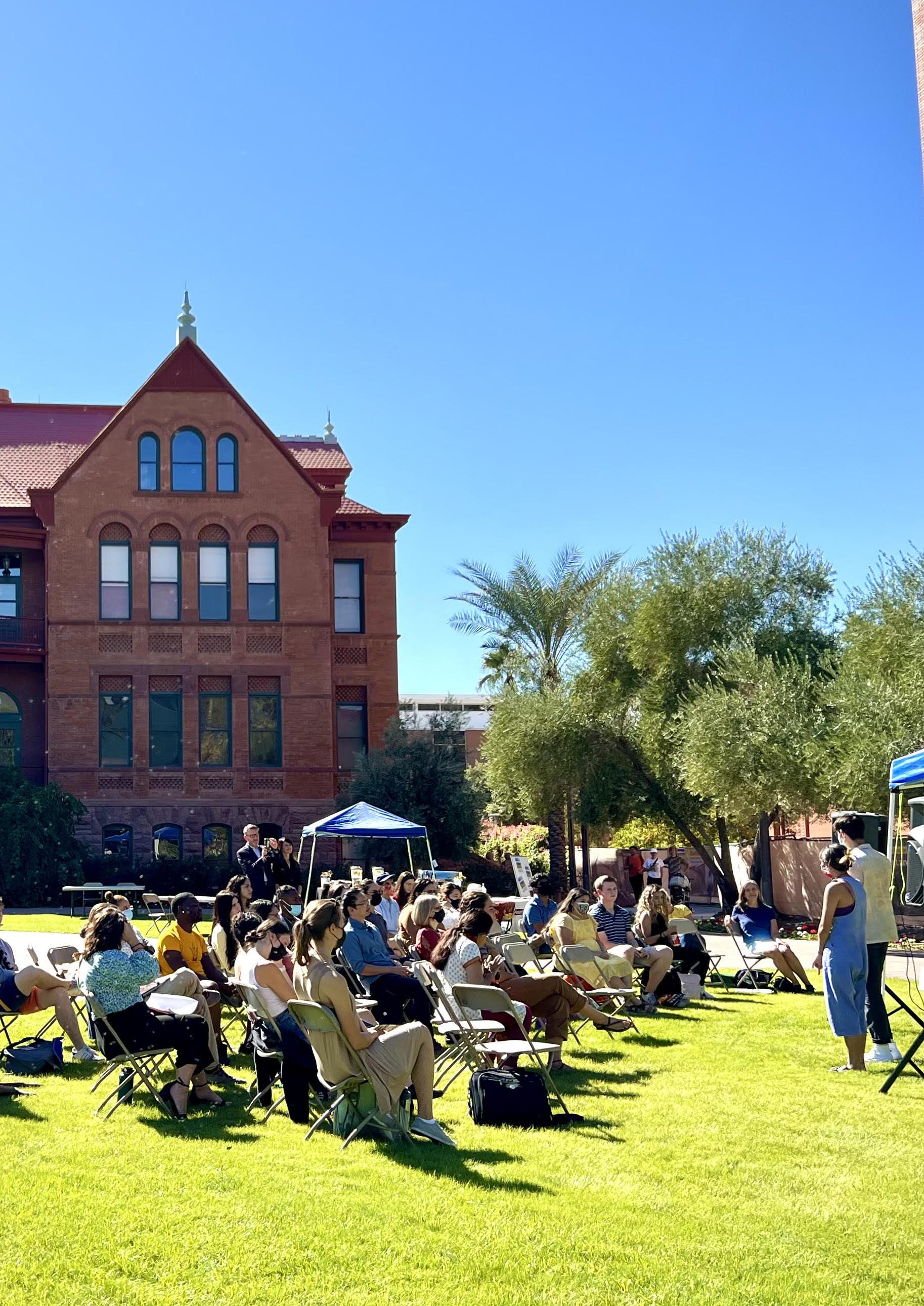
FALL 2021 - SPRING 2022


04. LEADERSHIP A NOTE FROM THE LAB DIRECTORS 06. INTERDISCIPLINARY TEAMS INTERDISCIPLINARY INSTRUCTIONAL TEAMS/ FACULTY TEAMS 10. LABS AT A GLANCE A VIEW ACROSS THE ACADEMIC YEAR/ LAB SPOTLIGHT 14. PROGRAMMATIC OFFERINGS ENHANCING EXPERIENCES/ FOOD STORIES/ ENGAGED LEARNERS 20. COLLBORATION COLLABORATIVE INITIATIVES/ SERVING EVERYONE 26. GROWTH A SNEAK PEEK/ PLANNING FORWARD 28. EVENTS A SNAPSHOT, FALL'21 - SPRING '22 30. TEAM THE HUMANITIES LAB TEAM/ GET IN TOUCH THE ANNUAL REPORT IMAGE BY: MAUREEN KOBIEROWSKI/ AMPLIFIER TEAM FALL '21
The Humanities Lab is at the forefront of experi ential learning at ASU, engaging both on campus and online students in solutions-oriented engagement in real world problems. Thoroughly interdisciplinary and always collaboratively taught, Humanities Lab courses welcome students from every college across the univer sity and provide them with a transformative experience grounded in humanistic inquiry. While addressing mat ters of urgent social concern, students learn the career competencies like effective communication and col laboration that will serve them well for the rest of their lives. They also enjoy a closely mentored experience where they get to know their instructors well, often forming a relationship that will extend well beyond the Lab. Community partnerships are integral to how these classes are structured, ensuring that the ASU mission of social engagement and community wellbeing is at the heart of these endeavors. Faculty who teach in the Lab also benefit, as many report their teaching is trans formed in the process.
Over the past year Humanities Lab has continued in its longtime commitment to working alongside local
Indigenous and BIPOC communities, resulting in Labs such as Language Emergency with the Salt River PimaMaricopa Indian Community and Avanzando Education Pathways with the Village of Maryvale. These Labs have provided more students the opportunity to work to effect change in communities with which they identify.

More than half of the students enrolled in Humanities Labs during the last academic year self-identified as minorities and more than a third as first-generation college students.

I commend Humanities Lab co-directors Juliann Vitullo and Heather Switzer for their leadership and the Humanities Lab staff for their dedication and vision. The future of the Humanities at ASU is bright … and I am proud that the Humanities Lab is blazing that trail. I look forward to what comes next.
of Humanities, The College
FOREWORD
Dean
Jeffrey Cohen
IMAGE BY: MAUREEN KOBIEROWSKI/ AMPLIFIER TEAM FALL '21
DIRECTORS' NOTE
The Humanities Lab creates inquiry-based, transdisciplinary, and inclusive research experiences for both undergraduate and graduate students. All Labs focus on a pressing social challenge with the common goal of encouraging students to reimagine their present and future worlds through collab orations with their peers, faculty, librarians, and community members. During the 21-22 academic year, Humanities Lab teams immersed themselves in a compelling array of ques tions: How do we indigenize our food systems? What does it mean to decolonize "madness" and “wellness” and support BIPOC communities? How do we create fashion that is sustain able? Can we narrate global development without repeating imperialist discourse? Can we forestall Indigenous language loss and promote language resurgence? How do we navigate chaos, humanize digital culture and leverage problem-based interdisciplinary research? In a world polarized by seemingly irreconcilable differences, Humanities Lab teams sought greater understanding and dreamed ethical and equitable interven tions that they artfully shared with the public.
We use several strategies to ensure that Labs include a diverse group of students with a variety of backgrounds, expe riences, and knowledge. All Labs are co-taught by 2 faculty from different disciplines (1 humanist + 1 non-humanist) and embed librarians who bring interdisciplinary training and per spective to the research process. Lab courses also carry multiple prefixes and general studies designations so that students can easily fit these research opportunities into any degree program. During AY 21-22, our students registered under 40 different program cross-listings and were taught by 26 faculty from 30 units/Schools and supported by 10 librarians. Over half of the students the Humanities Lab serves come from units outside of The College, which we love because it means the Humanities Lab draws students into the heart of the university through interdisciplinary, action-oriented learning.
This past year we have continued our commitment to cre ating Labs alongside local Indigenous and BIPOC communities, such as Language Emergency with the Salt River Pima-Maricopa Indian Community and Avanzando Education Pathways with the Village of Maryvale. These Labs have provided more stu dents the opportunity to work to effect change in communities with which they identify. According to data from the College, 59% of students in the Lab identify as non-Caucasian and 33% identify as first-generation students. As diverse student teams work with community members to develop impact outcomes responsive to community priorities, they learn the importance of humanist perspectives for analyzing wickedly enduring social problems from historical, cultural, linguistic and ethical perspectives and also gain valuable professional skills as they

HUMANITIES LAB - ANNUAL REPORT 4
IMAGE BY: MAUREEN KOBIEROWSKI
develop new research strategies and disseminate their work in different genres, including social media campaigns, documen taries, podcasts, webinars, white papers, performance art, and visual art such as large-installation street murals.
During Earth Week 2022, the Humanities Lab hosted our second Impact Outcomes Showcase that highlighted the award-winning projects that student teams had developed during the academic year. Many of the projects focus on Arizona’s Indigenous peoples, social challenges connected to racialization and racism, and the intersection of social jus tice and sustainability. Outcomes like the Chi’chil Countermap Project bring together BIPOC graduate and undergraduate students from SFIS, AIS and CISA to focus on the cultures and landscapes of regional Native Nations. With funding from Humanities Dean Jeffrey Cohen, Labs like Deconstructing Race and Indigenizing Food Systems diversify our offerings and provide community-embedded research opportunities as well as powerful mentoring relationships to a more inclu sive group of students.
Recently, President Crow commented to us that “the Humanities Lab is an exceptional example of what we can do when we collaborate in meaningful ways with the communi ties we serve.” We couldn’t agree more, of course. We are grate ful for faculty leads and School directors across the University who enable their faculty to teach Labs; it is difficult to over state the impact their participation has well beyond their home departments. We are both grateful to our home units and the directors of our Schools, Camilla Fojas and Michael Tueller, for their support of our directorship. We also thank our collabo rators Sally Kitch and Diana Ayton-Shenker, directors of the Seize the Moment Initiative, for financial support for ampli fying faculty and student impact. Dean Jeffrey Cohen works with The College to enable the success of the Humanities Lab, and Provost Nancy Gonzales’ continued encouragement and support drives our efforts.

The real heroes of the Humanities Lab are the staff. Our small team– Dr. Monica Boyd, Maureen Kobierowski, Pam Hintze, and wonderful student workers– spend their days making magic. Their commitment to inclusive, collaborative, transdisciplinary, and experiential learning animates every step of the alchemi cal process from inspiring idea to actual Lab course. For us as co-directors, having the opportunity to work with such a tal ented and dedicated staff and introducing ASU students to new ways of knowing, doing, and being are the principle rea sons directing the Lab continues to bring us great fulfillment.
Heather Switzer and Juliann Vitullo
Co-Directors, Humanities Lab

HUMANITIES LAB - ANNUAL REPORT 5
JULIANN VITULLO, ASSOCIATE PROFESSOR OF ITALIAN
Sincerely,
HEATHER SWITZER ASSOCIATE PROFESSOR OF WOMEN & GENDER STUDIES

HUMANITIES LAB - ANNUAL REPORT 6 INTERDISCIPLINARY INSTRUCTIONAL TEAMS: RIGOROUS, CREATIVE, COLLABORATIVE
Intentional collaboration provides the intellectual ratio nale and ethos for every Lab. Instructional teams model collaborative strategies for student teams, and student teams teach faculty and librarians what learning like this can do. These lessons reverberate and spillover. As Dave King (Future of Cars), explains, “co-teaching is very different from teaching on your own, and it requires different types of preparation and different types of cooperation, and I think that certainly is valuable to me. As a professor, you don't see teaching anymore--you only see your own teaching, so it's nice to see anybody else teach, you know, because it's different.” Annika Mann (Disrupting Dis/Ability) notes that the collaborative aspect of co-teaching was revelatory: “It was enormously productive to work with a faculty mem ber from outside the Humanities! What I found most excit ing about that work was coming together to plan assign ments, which allowed students to experience both qual itative and quantitative forms of analysis. [It] also helped me conceptualize classroom activities and assignments in new ways, and it was generative to model discussion and debate amongst ourselves for our students.”
For Lab student Natalie Scott, form followed function in Narrating Global Development: “I ... felt that I learned a lot about working in small groups. I was really happy with my group as everyone contributed and worked with each other. Sometimes projects would feel daunting because I was not used to reading a rubric and not having to tackle the entire thing myself. But in the time we got started with and finished our deliverables, of course, it had not been as hard as I thought it would be because there were three other people working on it too, contributing things I never would have thought of on my own. Funny enough, this is a great example of what [global] development can be. Different groups and people working together not com petitively, but with each group contributing their strong suits and aiming to create the best work that they can as a whole."
Humanities Lab students will eventually work in organi zations that build interdisciplinary teams to channel collec tive energy, and this is precisely what Labs do by providing a culturally and academically diverse forum. Matt Ogborn has been an embedded librarian in 4 Labs, and he notes: “Humanities Labs have definitely made it clear to me that the parts of my job that I treasure the most are learning about and supporting student (and faculty) research. They have also inspired me to consider ways to include import ant concepts like disability and decolonization when I dis cuss information privilege, access and institutional racism and sexism as part of 100-level instruction in information literacy.” As these comments suggest, Humanities Labs provide access to creative, courageous, research-inspired praxis seeded in collaboration and community.
ALTHOUGH PROF AGGARWAL AND I HAD WORKED TOGETH ER ON GRANT PROJECTS BE FORE, I HAD NEVER HAD THE PLEASURE OF SEEING HER TEACH. NOR WAS I AS FAMILIAR WITH THE POLICY ISSUES AS SHE, SO I WAS ABLE TO PUT FICTIONAL WORKS INTO A MUCH DEEPER, AND MORE POLICY-ORIENTED CONTEXT.
JONI ADAMSON - FOOD, HEALTH & CLIMATE CHANGE
IT WAS JUST ENTHRALLING TO WATCH HOW THESE STU DENTS, WHO NORMALLY WOULD NOT INTERACT, CAME TOGETHER AND WERE ABLE TO SHARE THE PERSPECTIVES THAT THEIR BACKGROUNDS AND MAJORS BROUGHT TO THE ISSUES DISCUSSED...
AARON GUEST - AGING IN AMERICAN CULTURE
CORA FOX - EPIDEMIC EMERGENCES
HUMANITIES LAB - ANNUAL REPORT 7
IMAGE BY: MAUREEN KOBIEROWSKI / EPIDEMIC EMERGENCES LAB
I HAVE NEVER TAUGHT A COURSE THAT GAVE ME MORE INSIGHT INTO THE LIVES OF ASU STUDENTS AND THEIR COMMUNITIES...
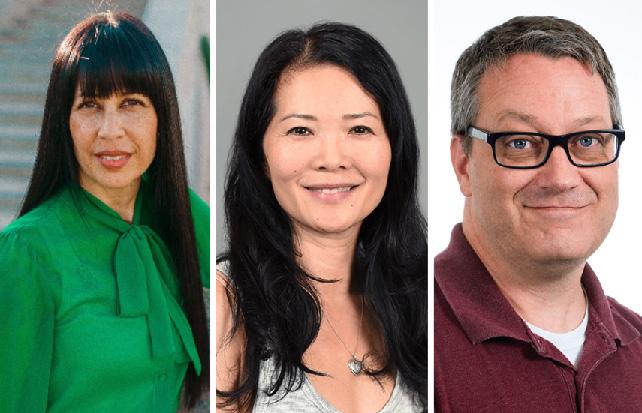
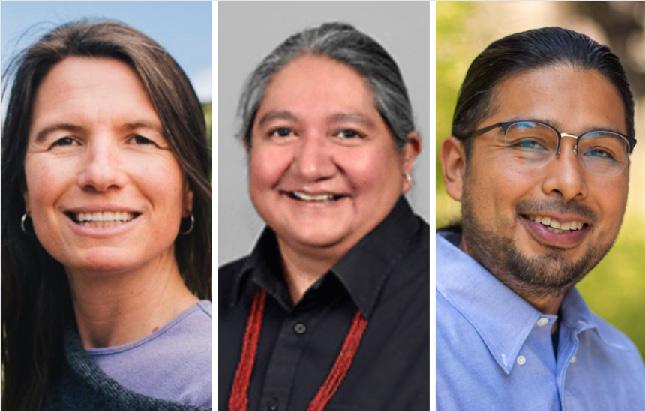



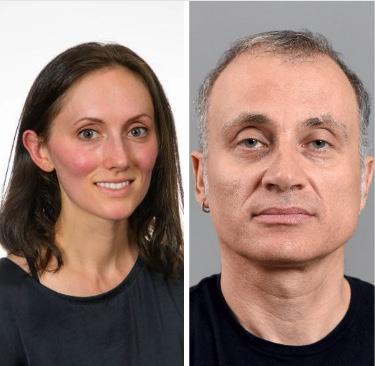

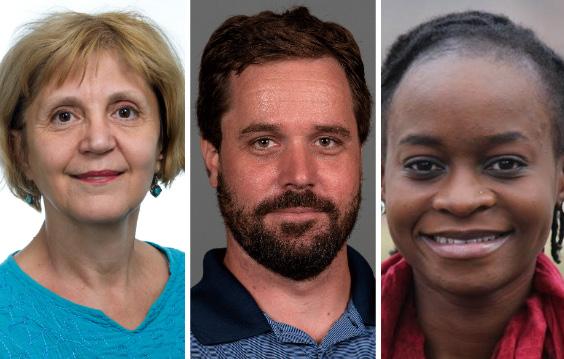

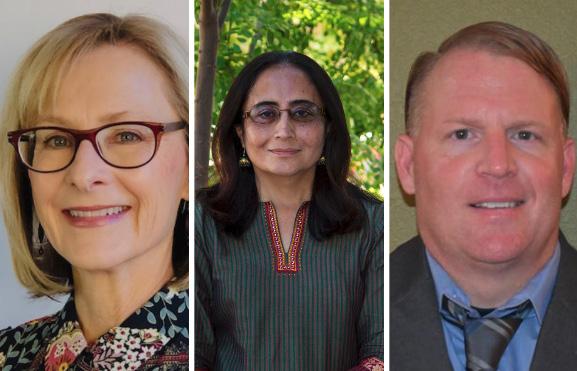
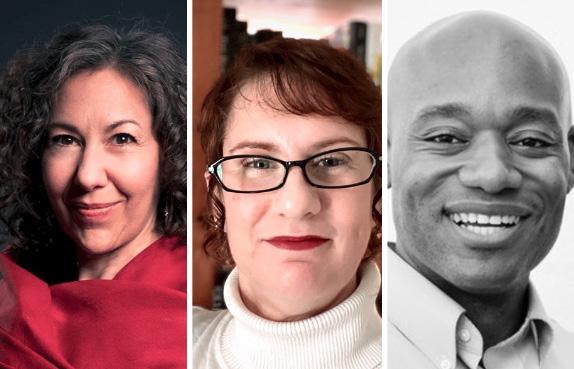
FACULTY TEAMS HUMANITIES LAB - ANNUAL REPORT 8 1A. 3A. 2A. 4A. 1B. 1C. 2B. 2C. 3C. 1D. 3D. 2D. 1E. 2E. 1F. 3E. 2F. 3F. 1G. 3G. 2G. 2H. 1I. 1J. 2I. 2J. 3J. 4J. 2K. 1K. 1L. 2L.
A. AGING IN AMERICAN CULTURE, FALL 2021
1A. MARY FITZGERALD, CO-FACULTY, HIDA
2A. AARON GUEST, CO-FACULTY EDSON COL LEGE
3A. EILEEN STANDLEY, CO-FACULTY, HIDA
4A. ALEXANDRA HUMPHREYS, LIBRARIAN
B. DECONSTRUCTING RACE, FALL 2021
1B. ISAAC JOSLIN, CO-FACULTY, SILC
2B. YUEKAI MLAMBO, CO-FACULTY, MLFTC
C. EPIDEMIC EMERGENCES, FALL 2021
1C. JENNIFER BRIAN, CO-FACULTY, BARRETT
2C.CORA FOX, CO-FACULTY, ENGLISH
3C. JANICE HERMER, LIBRARIAN
D. FOOD, HEALTH & CLIMATE CHANGE, FALL 2021
1D. JONI ADAMSON, CO-FACULTY, ENGLISH
2D. RIMJHIM AGGARWAL, CO-FACULTY, SOS
3D. JOSEPH BUENKER, LIBRARIAN
E. HUMANIZING DIGITAL CULTURE, FALL 2021
1E. DIANA AYTON - SHENKER, CO-FACULTY, HIDA, SFIS
2E. MONICA BOYD, CO-FACULTY, HLAB
3E. TIMOTHY SUMMERS, CO-FACULTY, ASU ADVANCE/ UTO
F. DECOLONIZING MADNESS, SPRING 2022
1F. LIZA HITA, CO-FACULTY, PSYCHOLOGY
2F. KAREN KUO, CO-FACULTY, SST
3F. MATTHEW OGBORN, LIBRARIAN
G. INDIGENIZING FOOD SYSTEMS, SPRING 2022
1G. MELISSA NELSON, CO-FACULTY, SOS
2G. MYLA VICENTI-CARPIO, CO-FACULTY, AIS
3G. ALEX SOTO, LIBRARIAN
H. INTRO TO INTERDISC. RESEARCH, SPRING 2022
1H. MONICA BOYD, CO-FACULTY, HLAB
2H.DANIEL STANTON, LIBRARIAN
I. LANGUAGE EMERGENCY, SPRING 2022
1I. LUIS BARRAGAN, CO-FACULTY, SALT RIVER PIMA-MARICOPA INDIAN COMMUNITY
2I. TYLER PETERSON, CO-FACULTY, ENGLISH
3I. DANKO SIPKA, CO-FACULTY, SILC
4I. JOSEPH BUENKER, LIBRARIAN
J. NARRATING GLOBAL DEVELOPMENT, SPRING 2022
1J. NINA BERMAN, CO-FACULTY, SILC
2J. GLEN GOODMAN, CO-FACULTY, SILC 3J. MARY JANE PARMENTIER, CO-FACULTY, SFIS 4J. QIAN LUI, LIBRARIAN
K. NAVIGATING CHAOS, SPRING 2022
1K. JASON BRONOWITZ, CO-FACULTY, POLYTECH ENTREPRENEURSHIP AND MANAGEMENT 2K. SHA XIN WEI, CO-FACULTY, HIDA
L. SUSTAINABLE FASHION, SPRING 2022
1L. JESSICA KOSAK, CO-FACULTY, FSH
2L. ENRICO MINARDI, CO-FACULTY, SILC
HUMANITIES LAB - ANNUAL REPORT 9
HUMANITIES LAB FACULTY COME FROM ACROSS THE UNIVERSITY, ENHANCING DIVERSITY FALL 2021 FACULTY DATA CRUNCH : 12 LAB FACULTY | ASU ADVANCE (1), BARRETT (1), EDSON (1), ENGLISH (2), HIDA (2), HLAB (1), MLFTC (1), SFIS (1), SILC (1), SOS (1)
2022 FACULTY DATA CRUNCH: 14 LAB FACULTY | AIS (1), ENG (1), FSH (1), HIDA (1), HLAB (1), POLY (1), PSYCH (1), SFIS (1), SILC (4), SOS (1), SST (1) AN ASSET TO THE UNIVERSITY
2021
SPRING
FALL
- SPRING 2022 LAB TEAMS


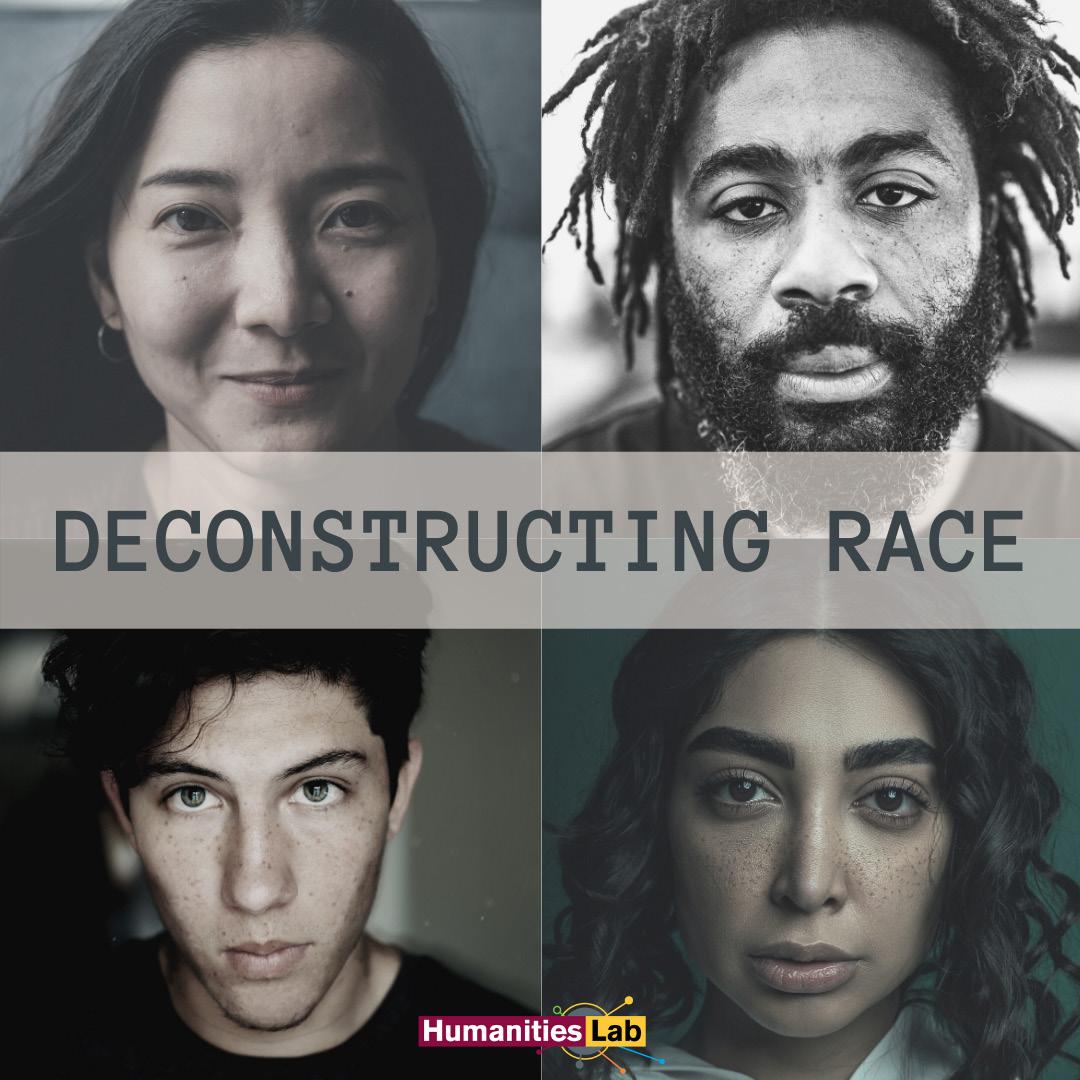



HUMANITIES LAB - ANNUAL REPORT 10 - 5 Labs - 17 Crosslist Partners - 11 Schools - 5 Colleges - 12 Faculty - 182 Students Fall 21 - 7 Labs - 23 Crosslist Partners - 10 Schools - 4 Colleges - 14 Faculty - 262 Students Spring 22
LABS: A VIEW ACROSS THE ACADEMIC YEAR






HUMANITIES LAB - ANNUAL REPORT 11

HUMANITIES LAB - ANNUAL REPORT 12 LAB SPOTLIGHT | CHALLENGING FOOD SYSTEM HISTORIES, REIMAGINING THE FUTURE OF FOOD IMAGE BY: MAUREEN KOBIEROWSKI / INDIGENINIZING FOOD SYSTEMS LAB
INDIGENIZING FOOD SYSTEMS: A RECIPE FOR SOCIAL CHANGE
COMBINE: 15 weeks of deep reading, interactive discus sion and debate, and intentional research with 2.5 dozen col laborating, multi-disciplinary, multi-generational, and cultur ally diverse students
ADD: 2 engaged interdisciplinary faculty, 1 from American Indian Studies and 1 from Sustainability, 1 director of the Labriola National American Indian Data Center, and 5 com munity-based thought-partners
TOP WITH: 2 award-winning Indigenous food sovereignty scholar-chefs

SERVE: a recipe for new knowledge that has the power to deeply impact a generation of doers
[In photo to the left:] Faculty, librarians, and students in Indigenizing Food Systems gathered with Indigenous leaders, ASU administrators, friends and family on Engrained’s patio at the Memorial Union for an afternoon cooking demonstration and two-course tasting menu with award-winning Indigenous chefs, Dr. Lois Ellen Frank (Kiowa) and Walter Whitewater (Diné). Lab students and their instructional team designed the pub lic event with support from the College of Global Futures Indigenous Knowledge Focal Team and a seed grant for our Transnationalizing Race series from Humanities Dean Jeffrey Cohen. Chef Frank and Chef Whitewater created a multi-sen sory experience by weaving history, political economy, story telling and song with mouth-watering, aromatic Indigenous dishes. They also participated as expert consultants and col laborators with student teams as they researched and devel oped their impact outcomes for the Lab.
Students in this Lab worked with each other, the instruc tional team, and 7 community-based expert consultants (includ ing Chefs Frank and Whitewater) to design and implement a col lection of outcomes ranging from zine-based Indigenous cook books to public garden plots dedicated to "Actualizing ASU's Land Acknowledgement and Uplifting Settler Consciousness" through native seed-sowing events.
HUMANITIES LAB - ANNUAL REPORT 13

HUMANITIES LAB - ANNUAL REPORT 14 ENHANCING EXPERIENCES, DEEPENING GROWTH TRAJECTORIES LAB PROGRAMMATIC OFFERINGS:
A B
Amplifier Beyond the Lab
Amplifier mini-grants amplifies student visions, allowing them to reach wider audiences and, proliferate impact.
In Fall 2021, with the generous support of the Seize the Moment (STM) initiative co-directed by Diana Ayton-Shenker and Sally Kitch, the Humanities Lab began offering Lab students the opportunity to to apply for Amplifier mini-grant funding to enrich and extend their work in the community. "The fund ing has been a gamechanger for students," shared Lab co-director Juliann Vitullo. "It’s gratifying to wit ness students develop viable outcomes through a collaborative process, and they tell us that the seed funding allows them to actualize the learning taking place in their Lab. For most of our students, the Lab is the first course they’ve ever taken that provides them with the opportunity to participate in a competitive small grant process."
The Amplifier mini-grant program has been such a success that the Humanities Lab, and the Lab Instructors themselves, have contributed additional funding to support student research. "We have so many passionate students," said Vitullo, "and when we saw the potential for great outcomes beyond what STM could fund, we’ve gotten creative. In some cases Lab faculty have contributed their own faculty development funding."
From Fall 2021 - Spring 2022 the Amplifier minigrant program has catalyzed the work of 20 student teams (88 students) and supported 20 outcome proj ects, with impacts ranging from panel discussions to podcasts. "It’s hard to imagine offering Labs without this key programming component," said Lab co-di rector Heather Switzer. "Empowering students to take action is what the Lab is all about, and the Amplifier mini grants extend our mission exponentially."
Beyond the Lab provides infras tructure to refine original outco mes beyond the semester - and now with fellowship funding.
The Beyond the Lab (BTL) program is designed to support student teams involved in significant projects that require time and space to accomplish beyond the initial Lab course. Students and faculty organize project work as independent study courses and col laboratively design their learning objectives, timeline and outcomes.
Beginning in Fall 2021, Seize the Moment (STM) funding has enriched the Lab’s support for BTL proj ects through fellowships. All student teams have the opportunity to apply through a competitive process for up to $5,000 to support outcomes initiated in their original Lab. The first BTL Fellowship was awarded to ElevatAR, an interdisciplinary, multigenerational team from the Lab's first ED Plus course, Humanizing Digital Culture. ElevatAR used their funding to col laborate with a software developer, an Augmented Reality (AR) developer, a performance artist, and a new media artist to build an AR software toolkit for "shar ing immersive stories using the elevator as a physical interface." According to ElevatAR, the closed doors of an elevator create "a digital window…that acts as a viewport into a far-away world; visitors physically navigate the floors of a virtual ‘Story Building’ using the car’s button panel.”
The Piipaash Storybook Teaching Guide team from the Language Emergency Lab will use their BTL Fellowship funding to develop and disseminate a set of curricular materials for Indigenous children, entitled Explore with Missy and Mary, designed in collabora tion with Piipaash community members for teaching and learning Piipaash.
HUMANITIES LAB - ANNUAL REPORT 15
IMAGE BY: MAUREEN KOBIEROWSKI / INTRO TO INTERDISCIPLINARY RESEARCH LAB
FOOD STORIES: FOOD, HEALTH & CLIMATE CHANGE
CHANGING FOOD SYSTEM FUTURES, RESCRIPTING HISTORIES
FOR THE PRESENT
As part of the inaugural Fall 2021 Humanities Week, the Food, Health & Climate Change Lab hosted a provoca tive public exploration of the role food plays in our social and cultural lives through research-informed storytelling and performance on Old Main lawn. Students’ evocative stories inspired all who attended, and passed by - includ ing Dean of Humanities, Jeffrey Cohen!

In preparation for the event, Lab students researched the history of a single food (e.g. maize; taro) through its natural scientific history, political and economic signifi cance, and representation in cultural narratives such as literature and film to curate and create an ethnographic history of the ingredient. Students used the ethnographic history of their foods to weave narratives of the food’s significance in their personal biographies and in their cultural lives.
Food stories were central to each team’s final project outcome, and every student team in this Lab applied for grant funding from the Humanities Lab and around the University to amplify their work. Student projects included QR-code-based research surveys designed to ascertain habits around single-use plastics on ASU cam puses in order to reduce use; an audacious performance piece exposing the role of greenwashing in the fast food industry; and documentary films celebrating local chefs and growers. Thanks to the Seize the Moment (STM) ini tiative and Joni Adamson and Rimjihm Aggarwal (the teaching team for the Lab) who donated research devel opment funds in support of student teams - every out come in the Lab benefitted from some degree of fund ing support.
HUMANITIES LAB - ANNUAL REPORT 16
IMAGE BY: MAUREEN KOBIEROWSKI / FOOD, HEALTH & CLIMATE CHANGE LAB

HUMANITIES LAB - ANNUAL REPORT 17 30+ Lab students who have enriched their Sun Devil stories! 100% 57% 43% Of students received STM or HLab grant funding through a competitive process Of students applied for grant funding to sup port outcomes Of students received grant funding from Lab faculty research funds
ENGAGED LEARNERS ARE WHY WE'RE HERE
Lab students consistently astound with creative, impactful community inverventions that am plify the voices of diverse stakehol ders and design more inclusive stra tegies for the pressing challenges we face.

IMAGE
/
LAB HUMANITIES LAB - ANNUAL REPORT 18
BY: MAUREEN KOBIEROWSKI
EPIDEMIC EMERGENCES
NEW WAYS OF KNOWING, DOING AND BEING
Some of our proudest student accomplishments this year.
DISRUPTING DIS/ABILITY:
· In the Spring of 2021 Disrupting Dis/Ability Lab students created a standout semester of impacts. In Fall 2021, the Accessibility Coalition, one of the impacts conceptualized in the Lab, became the 8th Coalition to be inducted into the Council of Coalitions. In Spring of 2022, the Accessibility Coalition was awarded a coveted Pitchfork Award from ASU Student Life as the "Most Promising New Student Organization" on campus.
· In Fall of 2021 another Disrupting Disability student, RaNiyah Taylor, also continued the Lab’s mission. Taylor was one of the leads in the course's Mapping Access project which created a new accessibility layer for the ASU interactive map. She used her Barrett Honors thesis opportunity to create "A Guide for Universities to Cultivate Inclusion” which guides student-driven accessibility projects in higher ed. She also designed a website to house the booklet as well as documen tation of the Mapping Access @ ASU project that can be viewed HERE. Post graduation, Taylor accepted an invitation to serve in the Peace Corps in Belize as a Youth Health Educator. She is still in touch with the Lab!
EPIDEMIC EMERGENCES:

· In late Fall of 2021 Epidemic Emergences students took over the Humanities Lab’s Instagram for the week to pro mote their team’s COVID-related intersectional interventions. The takeover was intended to be informative of the outcome projects that were developing in the Lab, but it was also to attract visitors to their showcase event held out front of the Student Pavilion. The event featured 5 teams including a team called Immigrant Households and Barriers to Vaccination. These students were Amplifier mini-grant awardees and produced brochures (image on left) for marginalized commu nities addressing common concerns regarding the COVID 19 vaccine and vaccine hesitancy. The team partnered with COVID Latino, Dr. Gilberto Lopez from the School of Transborder Studies, Dr. Martinez from the College of Interdisciplinary Humanities and the student group MECHA de ASU.
DECONSTRUCTING RACE:
· As part of the Humanities Lab’s Transnationalizing Race series, this Lab partnered with collaborators including film maker Fred Kuwornu - to actively discuss concepts from his film Blaxploitalian: 100 Years of Blackness in Italian Cinema as well as with Nnedi Okorafor, acclaimed Africanfuturist and author of several titles including “Mother of Invention.” From these experiences, and others, students designed and led a variety of outcomes. One of these being a website full of ped agogical materials (including icebreakers, activities, films and questions) designed to help educators teach race in the classroom. Another Lab outcome was led by a student team that hosted a live panel discussion on “Racial Representation in Video Games.” The panel featured a gaming industry design professional as well as professors from the University of Kentucky and Ontario Tech University who research and study video games.
INDIGENIZING FOOD SYSTEMS:
· The Indigenizing Food Systems Lab (featured on pages 12-13) developed a broad series of student research outcomes. Key outcomes included a Native-led project titled the O’odham Meal Box project. This outcome-initiative was selected for funding from the Labriola Center and produced meal boxes intended to promote Indigenous health and food sover eignty while providing access to the traditional O’odham foods. The Labriola Center also partnered with an O’odham ally project called Indigenous Food Systems Resource Guide, a team who designed a digitized living document intended to drive dialogue and serve as a resource guide with tabs articulating the various layers of the food system over time. Both outcomes live on the ASU Library – Library Guides digital archive collection.
HUMANITIES LAB - ANNUAL REPORT 19

IMAGE
HUMANITIES LAB - ANNUAL REPORT 20 COLLABORATIONS: ACROSS THE UNIVERSITY, ACROSS THE GLOBE
BY: MAUREEN KOBIEROWSKI / EPIDEMIC ERERGENCES LAB
The College: Transnationalizing Race & Public Humanities
In the 21-22' academic year two Labs in our curated Lab series, Transnationalizing Race, were made possible by our supportive partner ship with The College seed grant, $10k.This series investigates questions of transnational racial (in)justice in the Southwest borderlands and in Africa and the African diaspora. Deconstructing Race (Fall 21), taught by Isaac Joslin (SILC) and Yeukai Mlambo (Mastercard Foundation Digital Initiatives/ EdPlus and MLFTC) and Indigenizing Food Systems (Spring 22), Myla Vicenti Carpio (AIS) and Melissa K. Nelson (SOS/GFL) are also the first Humanities Labs to be cross-listed as African and African American Studies and American Indian Studies respectively and to engage faculty from these units. The second Lab also hosted 2 public events associated with Indigenizing Food Systems (Indigenous Chefs cooking demo; Brian Yazzie, public lecture) as part of the Julie Ann Wrigley Global Futures Laboratory Earth Week and the opening celebrations of the Rob & Melani Walton Center for Planetary Health. Brian Yazzie offered the 2022 Distinguished Lecture in Environmental Humanities. We are excited to report that we will offer Indigenizing Food Systems again in Spring 23. During this same time period the Lab established an exciting part nership with the Center for Public Humanities (CPH). CPH utilized the Lab's prefix (HUL) and its collaborative, experiential pedagogical model to pilot a “Poetry in America'' summer course as an intensive week-long oCourse for high school students in India (July 4-12; synchronous ses sions occurring July 4-8 & July 11-12). Through CPH, the Lab partners with The Big Red Group (Nimish Jalan, ASU Thunderbird alum, COO), the firm that recruits students and facilitates connections with ASU. The program enrolled 55 students during this pilot and the Lab anticipates that these enrollments will increase in future iterations. This partnership links the Humanities Lab with Learning Enterprise.
SPOTLIGHT | What Collaborations Look Like Across a Semester

Deconstructing Race Humanities Lab

- Fred Kuwornu: Filmmaker of Blaxploitalian: 100 Years of Blackness in Italian Cinema
- Nnedi Okorafor: Professor of Practice, Interplanetary Initiative and English/ Creative Writing, ASU
- Dr. Clément Akassi: International Symposium Chair, Howard University
- Dr. Hervé Tchumkam: Professor of World Languages and Literature, Southern Methodist University
- Alois Mlambo: Professor Emeritus, Heritage and Historical Studies, University of Pretoria
- Gilbert Ndi-Shang: Professor of Romance Literature, University of Bayreuth
- Jean-Pierre Karegeye: Visiting Scholar of Philosophy, Dickinson College
- Ruben Espinoza: Associate Director, Arizona Center for Medieval and Renaissance Studies at ASU
- Ciara Mary Greene: Fulbright Post-Doctoral Scholar, University College Dublin
- Cultural Resources Department of the Salt River Pima Maricopa Indian Community
- Matthew Toro: Director of Maps, Imagery and Geospatial Services, Map and Geospatial Hub, ASU Library
- Motoki Nomachi: Professor of Slavic Minority Languages, Hokkaido University
- Labriola National American Indian Data Center, ASU Library
- Joseph Buenker: Associate Librarian, Humanities Division, ASU Library
HUMANITIES LAB - ANNUAL REPORT 21
COLLABORATIVE INITIATIVES CONT.
Seize the Moment
Over the past year the Lab has collaborated with Sally Kitch and Diana Ayton-Shenker, directors of STM, to enhance HL pro gramming through strategic partnership. With ASU Leonardo and GFL, the Lab hired a Program Coordinator/Public Engagement Specialist who works extensively with the HL’s Program Manager/ Communications Specialist to administer Amplifier Mini Grants and Beyond the Lab Fellowships (see page 15). These grants and fellowships offer students, especially undergraduates, a valuable opportunity to clarify the goals of their impact outcomes through transdisciplinary collaboration and participate in the process of applying for funds to finance a project that they have helped design. STM also supports seed funding for collaborative faculty research. In collaboration with the HL, STM has awarded 3 faculty research seed grants to 3 collaborative, interdisciplinary teams: Turn it Around Cards (Adriene Jenik/Art:HIDA & Iveta Silova/MLFTC); Devising the Anthropocene (Rachel Bowditch/Dance:HIDA & Steven Beschloss/CLAS/GFL/CSMC), and Arizona Cares (Michelle Stuckey/ CISA & Stephanie Pena/SSW). The research seed grant teams reflect the breadth of the interdisciplinary collaborations the HL inspires.

The Global Futures Laboratory: UNESCO/BRIDGES
Over the past year the Lab has collaborated with Joni Adamson, director of UNESCO BRIDGES Humanities-led Science Coalition in the Global Futures Laboratory, to curate a series of BRIDGES UNESCO Humanities Labs focused on the United Nation's Sustainable Development Goals. Gendering Peace and Security, offered in Spring 2023, is the first Lab in the series, and will be co-taught by Miki Kittilson, Vice Dean and Senior Global Futures Scientist, Julie Ann Wrigley Global Futures Laboratory and Mohadeseh Mousazadeh Miandehi, a doctoral scholar from the Department of English. The Lab will focus on gendered violence and local/global institutions created to increase peace and security.

HUMANITIES LAB - ANNUAL REPORT 22
Diplomacy Lab: U.S. Department of State

While teaching a Humanities Lab, Dr. Glen Goodman (SILC) realized he could leverage his administrative network within his teaching to create more opportunities for students. In Spring of 2022, Goodman, Humanities Lab’s co-directors Heather Switzer and Juliann Vitullo, and former Ambassador Roderick Moore (ASU Washington D.C.) submitted an application to the U.S. Department of State for ASU to become an active partner in their Diplomacy Lab program. Students participating in Diplomacy Labs through the Humanities Lab will research real-world challenges under con sideration by the State Department, while an interdisciplinary fac ulty team mentors them through the process. Our application was approved in July 2022. Together with Dr. Mary Jane Parmentier (SFIS), Dr. Goodman has successfully bid for a U.S. Department of State challenge in Latin America that students will investigate in their Spring 2023 Humanities Lab.
One Square Mile and Maryvale Youth Summit
During this period the Lab has collaborated with the Design Studio for Community Solutions' One Square Mile Initiative (Watts College of Public Service and Community Solutions) to develop a Lab entitled Avanzando: Educational Pathways, co-taught in Fall 2023 by Dulce Estevez (SILC) and Mara Lopez (Center for Broadening Participation in STEM). Students in the Lab work closely with stake holders in the Phoenix village of Maryvale to understand the bar riers to education, disrupt racialized narratives about the commu nity, and create new educational opportunities for Maryvale youth.
The Lab has collaborated during this period with Christina Ngo and her staff in the Office of Social Embeddedness in the President’s Office. Co-directors Heather Switzer and Juliann Vitullo participated in a day-long Maryvale Youth Summit in March 2022, and the ASU student/Maryvale high school student teams established during the Summit continue their work in Fall 2023, involving student teams from the Avanzando: Educational Pathways Lab. Humanities Lab students welcomed Maryvale youth to ASU for a Humanities Week event, Avanzando Las Humanidades: Education Stories, that highlighted culturally and socially responsive pathways to higher education and celebrated the role of the humanities and the arts in the lives of the students and their mentors.

HUMANITIES LAB - ANNUAL REPORT 23
One of the pillars of our pedagogy is responsive, acces sible, and inclusive design. Labs always prioritize local com munities on and off campus and often are designed in col laboration with local stakeholders. Lab teams work with a wide range of experts and everyday people, listening care fully to voices that have traditionally been marginalized, to create more inclusive strategies developed in response to local social challenges.
Lab students’ deep resonance with our commitment to social embeddedness is in evidence in the outcomes they create and in their feedback. For Jhanz Marco Garcia, a soph omore majoring in anthropology and student in Epidemic Emergences, vaccine hesitancy hits home: "I come from an immigrant family. I recognize many immigrants, specifically undocumented immigrants, do not receive the type of pro tections and benefits that citizens are privileged with in America. This makes it even more difficult for those trying to make a living in a country with a culture and language alien to that which they are accustomed.” Through research, Marco Garcia and his teammates found many reasons for vaccine hesitancy in marginalized communities, including among undocumented members. They were awarded a competitive Amplifier mini-grant to expand the reach of their public health campaign to address community con cerns through research-based, visually compelling pam phlets. For Marco Garcia, “tailoring public health materials
specifically for an immigrant group as a class project felt like a step in the right direction” and reaffirmed his own personal career aspirations.

Student-led outcomes have also focused on Arizona’s Indigenous peoples, social challenges connected to racial ization, and the intersection of social justice and sustain ability. Outcomes like the Chi’chil Countermap Project, an online countermap of the Emory Oak and its acorns signif icance to Apache people from the Spring ’22 Indigenizing Food Systems Lab, brought together BIPOC graduate and undergraduate students from different academic disciplines to focus on the cultures and landscapes of Indigenous com munities. This counter-mapping team included a PhD stu dent from SFIS, a MA student from AIS, a freshman from CISA, and two undergraduates from the College of Global Futures.

Building inclusive courses with intellectually and socially safe environments to explore social issues is attractive to students who identify with minoritized and first-generation communities, and this pedagogic strategy is born out by the numbers. For the academic year from Fall ’21 – Spring ’22, 59% of students in the Lab identified as non-Caucasian of minority descent and 33% of total enrollment for the aca demic year identified as first-generation college students.
Activating the ASU charter through the Humanities Lab’s pedagogical structure, the Lab has been able to partner
HUMANITIES LAB - ANNUAL REPORT 24
with a range of internal and external partners. One exam ple is the Spring ‘21 Language Emergency Lab, focusing on Indigenous language loss, which worked directly with the Salt River Pima-Maricopa Indian Community’s O’odham Piipaash Language Program (OPLP). OPLP manager Luis Barragan was integrated into the course as part of the teach ing team providing Indigenous leadership and enabling students to design solution-oriented outcomes for chal lenges that the community had prioritized.
One Amplifier-funded team from this Lab created a Piipaash Storybook Teaching Guide. The guide includes teaching materials, lesson plans, activity worksheets and a storybook (including an audio version by a native speaker) that are all aimed at early childhood education language preservation efforts. The students on this research team were awarded a Beyond the Lab fellowship through the Lab’s Seize the Moment partnership to continue their work as a Fall ’22 Beyond the Lab independent study.

IMAGE
FOOD
SERVING
THROUGH
HUMANITIES LAB - ANNUAL REPORT 25
BY: MAUREEN KOBIEROWSKI / INDIGENIZING
SYSTEMS LAB
EVERYONE
COMMUNITY COLLABORATIONS
GROWTH & FUTURE PLANS


HUMANITIES LAB - ANNUAL REPORT 26
HUMANITIES LAB DEDICATED CLASSROOM SPACE LOCATED IN THE WALTON CENTER FOR PLANETARY HEALTH, WCPH-409
PLANNING FORWARD Labs and co-Lab-orations
Fall 2022
• Avanzando: Educational Pathways: Dulce Estevez (SILC) and Mara Lopez (Center for Broadening STEM) partners with the village of Maryvale, the Design Studio for Community Solutions in Watt’s College, Maryvale High School, and Nancy Godoy, the Director of ASU Library’s Community-Dri ven Archives Initiative.
• Justice Through School Gardens: Joan McGregor (SPHRS) and Steven Zuiker (MLFTC), faculty from the Healthy Schools Network, and Librarian Alexandra Humphreys, partner with a local school garden.
• Humanizing Digital Culture: Elizabeth Grumbach (Lincoln Center for Applied Ethics) and Jason Bronowitz (Fulton Engineering).
Spring 2023
• Designing the Future University: Christopher Boone (SOS), Vanessa Fonseco (CISA), Richard Ames bury (SHPRS), and Joyce Martin (ASU Library).
• Diplomacy Lab: Latin America [Dept of State Diplomacy Lab series]: Glen Goodman (SILC) and Mary Jane Parmentier (SFIS).
• Gendering Peace & Security [BRIDGES UNESCO series]: Miki Kittlison (SPGS and GFL) and Mohade seh Mousazadeh Miandehi (English).
• Indigenizing Food Systems II [Transnationalizing Race series]: Melissa Wilson (SOS), Myla Vicenti Carpio (AIS), and Alex Soto (Labriola Center).
• Intro to Interdisciplinary Research: Monica Boyd (HUL) and Jason Bronowitz (Fulton Engineering). A Lab staple, this course will be offered in a new format (iCourse and oCourse).
• Making Noise, Making Sound?: Serena Ferrando (SILC), Kimberly Marshall (SMDT), and Matt Ogborn (ASU Library).
• Migration, Art, Place [GIE series]: Berlin/Phoenix: Christiane Reves (SILC), Claudia Sadowski-Smith (ENG) and Alexandra Humphreys (ASU Library). This course is planned with a GIE to Berlin.
HUMANITIES LAB - ANNUAL REPORT 27



HUMANITIES LAB - ANNUAL REPORT 28
SNAPSHOT
'21 + SPRING '22
semester the Lab offers cour ses focused on some of the world's most pressing challenges. Events are one way the Lab helps students showcase their outcomes by provi ding public forums for meaningful dialogue and engagement with urgent issues.
EVENTS: A
FALL
Each
The
you
Want to attend? Register HERE Fred Kuwornu LUNCH WITH FILM MAKER ACTIVITST EDUCATOR FRED KUWORNU IS A FILMMAKER ACTIVIST-PRODUCEREDUCATOR, BORN AND RAISED IN ITALY AND BASED IN BROOKLYN. HIS MOTHER IS AN ITALIAN JEW, AND HIS FATHER IS A GHANAIAN SURGEON WHO LIVED IN ITALY SINCE THE EARLY 60'S. FRED KUWORNU HOLDS A BACHELOR’S DEGREE IN POLITICAL SCIENCE AND MASS MEDIA, FROM THE UNIVERSITY OF BOLOGNA. HE ALSO TEACHES COURSES ON PRODUCTION AND DIGITAL FILMMAKING, ON BLACK DIASPORA IN CONTEMPORARY ITALY AND EUROPE AND IN 2021, HE FOUNDED THE SUMMER SCHOOL - TEACHING BLACK ITALY. READ MORE ABOUT FRED KUWORNU HERE. INDIGENIZING FOOD SYSTEMS , INDIGENOUS CHEF COOKING DEMONSTRATION AND TASTING HUMANITIES LAB AND SEIZE THE MOMENT IMPACT OUTCOMES SHOWCASE EVENT
“Each year when we look back we are astounded by our growth and beyond proud of our impact.”
Humanities Lab welcomes graduate students - from all ASU graduate programs to join the Lab for an interactive in-person lunch with Fred Kuwornu. Centered on open discussions of race, Kuwornu's award-winning film documentaries as well as his research and teaching we invite
to lunch, ask questions, learn and engage!
es Lab + Seize the Moment OUTCOMES SHOWCASE
end-of-semester public outcomes showcase highlighting changedriven outcomes from award-winning students & faculty at Arizona State University.




The Humanities Lab and Seize the Moment Impact Outcomes Showcase is a public outcomes event celebrating the dynamic, interdisciplinary work of the Humanities Lab and ASU Leonardo as part of the Seize the Moment initiative at Arizona State University The event highlights the Spring '22 semester's Seed Grants, Amplifier Mini Grants, and Beyond the Lab Fellowship awardees alongside their transformative efforts Come along and browse the showcase!
The showcase features:
Amplifier Mini Grant Outcomes
Actualizing ASU's Land Acknowledgement and Uplifting Settler Consciousness


Chi'chil Countermap Project

Cultural Arts Teaching Kits
Econexiones, A Podcast Series Home Indigenous Zine
Not Trendy but Timeless: A Sustainable Supply Chain Showcase

Phoenix Utopia Manifesto: Creating Wellness
Piipaash Storybook Teaching Guide
Racial Justice throughout the United States
Beyond the Lab Fellowships
ElevatAR Sporks Up
Seed Grant Research Projects
The Anthropocene
April 20th | 3:30 - 5:00pm |
ISTB7 Atrium
HUMANITIES LAB - ANNUAL REPORT 29
WEDNESDAY WEDNESDAY NOVEMBER 3RD NOVEMBER 3RD 12-1PM 12-1PM






STUDENT COMMUNICATIONS ASSISTANTS: - ALEXANDER FENLON CONSERVATION BIOLOGY/ ECOLOGY - MALIA WILSONSOCIAL WORK AND JUSTICE STUDIES THE HUMANITES LAB TEAM HUMANITIESLAB@ASU.EDU WWW.HUMANITIES.LAB.ASU.EDU ADMINISTRATIVE OFFICES: DURHAM HALL 2ND FLOOR - SUITE 246 A-E LAB CLASSROOM: WALTON CENTER FOR PLANETARY HEALTH 4TH FLOOR - RM 409 GIVE A GIFT HUMANITIES LAB - ANNUAL REPORT 30 HEATHER SWITZER CO-DIRECTOR JULIANN VITULLO CO-DIRECTOR MONICA BOYD PROGRAM MANAGER MAUREEN KOBIEROWSKI COMMUNICATIONS SPECIALIST PAMELA HINTZE BUSINESS OPERATIONS SPECIALIST, SR
A special thank you to Sally Kitch, founding director of the Humanities Lab, for her original vision and her ongoing advocacy for the human ities in all facets of higher education.




@ASU.Humanities.Lab @HumanitiesLab @HumanitiesLab_
HUMANITIES LAB - ANNUAL REPORT 31







































































